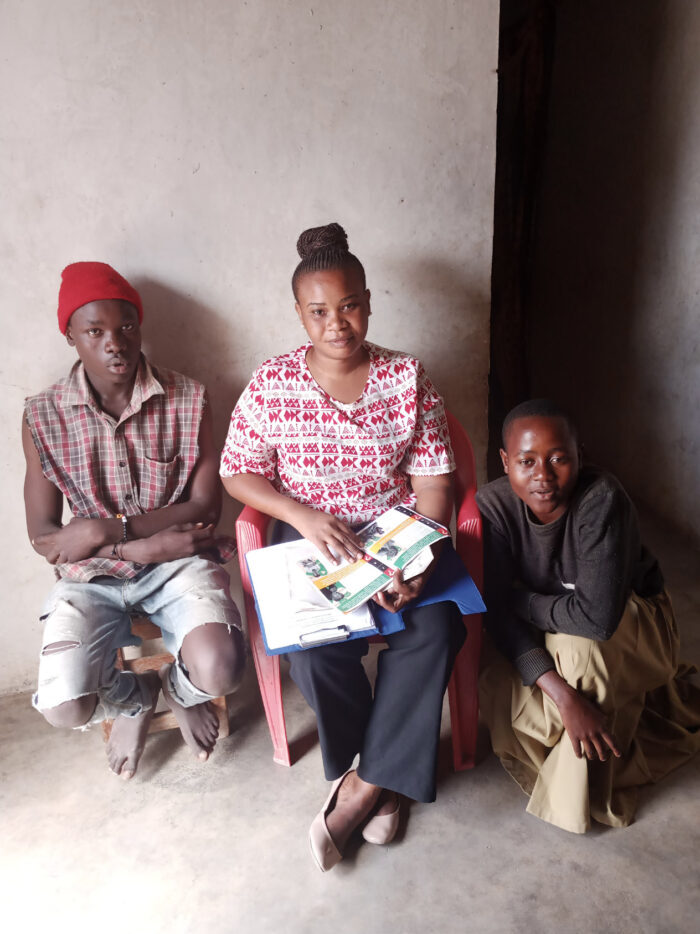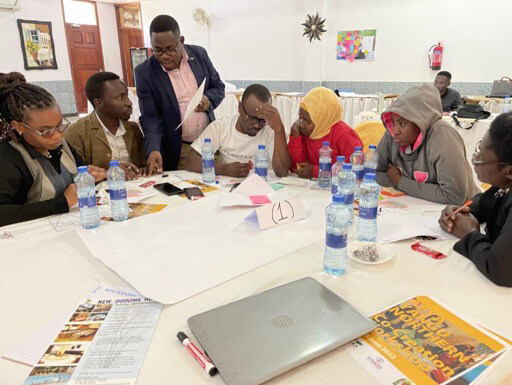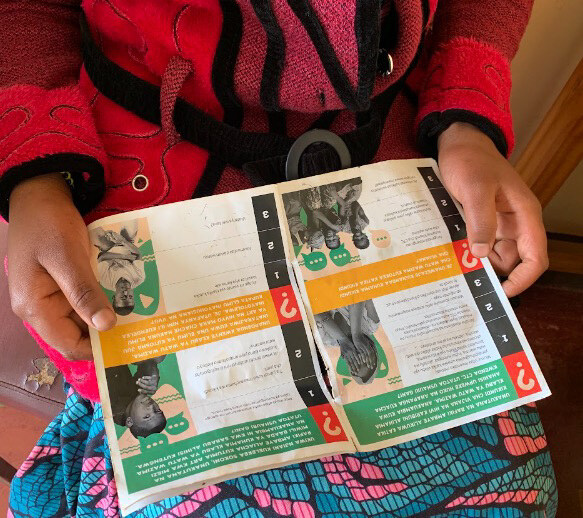“Human Centered Design has helped me to be open too,” Hellen Wegesa, USAID Afya Yangu Northern HCD field coordinator.
In Tanzania, the shift away from adolescent health services occurs at the age of 18. With little transitional education and support, navigating the adjustment of adult care can be overwhelming for young adults. The uncertainty of this adjustment especially impacts young adults living with HIV, many of whom have heavily relied on adolescent peer support groups and health services in their day to day lives.

Recognizing this challenge, the USAID Afya Yangu Northern Project used human centered design (HCD) methodologies to engage adolescents living with HIV, encouraging them to find and use their voices to identify barriers and opportunities in their healthcare experience. Authentic curiosity and meaningful engagement present opportunities to uncover deeper insights. The USAID Afyu Yangu Northern Mpito health booklet that emerged from this process exemplifies how powerful yet simple solutions are illuminated when you provide a level platform for people to be the experts in their own lives.
Trying Something New

When Hellen Wegesa was initially approached to conduct immersion interviews, she was understandably a bit apprehensive. As a field facilitator in Dodoma, she had experience working with people, asking basic questions related to the provision of services, but never before had she facilitated an immersion style interview, a methodology used in human centered design that digs into the crux of the human experience, probing at people’s thoughts, feelings, and rationales.
“At the beginning of this project, I expected we were going to offer HIV (information) to clients and help them with basic needs and giving them medicine,” said Hellen.
“My mind changed when I started my immersion activities. I started to understand that we have to dig deeper into peopleʼs thoughts.”
As a field facilitator for two years, Hellen has seen the struggle that young men and women living with HIV face in both accessing and navigating the continuum of care; stigma and a lack of knowledge are compounded by feelings of loneliness and isolation, often leading to poor ART adherence, depression, and negative health outcomes.

Determined to help disrupt this cycle, Hellen agreed to participate in the USAID Afya Yangu Northern project. She was trained on human centered design best practice and learned the process for conducting immersion style interviews.
She naturally gravitated towards immersions as an interpersonal interview style, liking that she could follow an intentional and thoughtfully developed facilitation guide, but also use her curiosity and intuition to follow interesting threads in conversations. As Hellen conducted more immersion interviews with young men and women, her confidence not only grew, but she began to notice the power of empathy in her own life and perspective.
“Immersions have taught me how to be empathetic, I have learned that I donʼt have to judge a person,” reflected Hellen. “Staying calm and forming a good relationship with the person you are talking to is a great way to understand whatʼs [within] a person. I now keep in mind to respect people’s opinion regardless of their status and position or life story.”
She also noticed positive impacts amongst the young men and women she engaged with; not only did she see increased engagement, trust, and rich dialogue from an interpersonal point of view, but she also heard more meaningful and thoughtful insights about the barriers and enablers to accessing care.
By giving young men and women living with HIV the space and opportunity to unpack their fears, concerns, hopes, and dreams about their lives, Hellen was able to better understand their humanity, and in the process, better pinpoint the areas where supportive healthcare fits within that.
Co-Creating Solutions

After the immersion interviews, Hellen was excited to continue to build momentum for change. Alongside a variety of stakeholders in the wider ecosystem of young men and womenʼs lives, she co-facilitated a co-creation workshop, a pivotal part of the human centered design process. She quickly saw the value of putting “ordinary” people at the center of the solution-making process.
Through an intentionally curated co-creation design process, the session built on the findings from the immersions, ultimately leading the group of stakeholders to identify the need for a transitional support booklet to better aid young men and women living with HIV to navigate the continuum of adult healthcare.
The proposed design, content, and layout of the transitional support booklet that emerged from the co-creation was then field tested across ten facilities over a 3 month period; the findings of this process have led to the development of several versions of the transitional support booklet, with feedback loops in place to continue to shape ongoing incremental improvements and iterations of the Mpito support booklet today.
Since the roll out of the Mpito booklet, Hellen has continued her field visits with young adults living with HIV and has seen noticeable enthusiasm. Users of the booklet point to two attractive features in particular; the helpful nature of the content in helping them understand the components of adult care services and its ability to unify, and in some ways, emulate the support groups they relied on in adolescence.
One young adult living with HIV told Hellen “the transitional booklet brings us together; we come at the CTC and sit together to discuss the information in it,” underscoring how the booklet has made navigating care less of a lonely experience, and more of a collective one.
Through this process, Hellen has become more acutely aware of the challenges marginalized populations face in seeking care, and has found that human centered design has the ability to unlock empathy across the board.

“HCD has helped me to be open too, I recommend this approach to be used in other projects.”
Through the intentionality of HCD, simple, but powerful solutions like the Mpito booklet can make people feel heard, recognized, and valued; and in a world full of challenges, thatʼs important.
The USAID Afya Yangu Northern is designed around client-centered approaches to address gaps in HIV, TB and family planning service delivery, while continuously building and transferring the capacity of local stakeholders for sustainable and country-led ownership.
USAID Afya Yangu Northern focuses intensely on direct service delivery across all regions in early project years, ensuring that gaps to epidemic control are identified, and tailored solutions are designed to meet the needs of vulnerable populations.



